
As Cal State Long Beach continues to test the waters, a campuswide email provided some clarity on the status of drinking fountains on campus.
Just a week after the announcement that some drinking fountains in the McIntosh building tested positive for lead, Mary Stephens, vice president of administration in finance, sent an email to all students and staff addressing the current state of the drinking fountains on campus.
“While we believe the impacts are limited, because this is a matter of importance to the health and well-being of our community, the university is investing in experts and solutions that will provide us with a water delivery system,” Stephens said.
She also specified that the issue has nothing to do with the water received from the City of Long Beach, and that it is a problem lies within some of the buildings on campus.
The email offered a link to a frequently asked questions document which contained information on testing sites and information on water quality. According to the document, the university has hired a Fullerton environmental company to test the drinking fountains called Titan Environmental.
According to the FAQ, all kitchen faucets and drinking fountains in facilities and buildings constructed after 1980 are slated to be tested. The sites include: Student Health Services Center, University Student Union, The Research Foundation Building, The Student Recreation and Wellness Center, The 49er Shops food preparation areas, Residential housing, Isabel Patterson Child Development Center, Family and Consumer Sciences Family and the Child Center.
Chris Burnett, facilities director of the college of liberal arts also sent an email blast to faculty on Wednesday, announcing that the campus has determined a plan to address the issue.
Over 100 campus locations were tested Nov. 10 and results are still pending review.
The university will be moving to replace all fountains in buildings built before 1990, starting with the Childcare Center and the McIntosh building.
Additionally, the email from Burnett included that outdoor hydration stations do not have the same filtering system as indoor hydration stations and will be tested as well.
All indoor hydration stations will remain on as they are filtered and have been deemed safe.
“There will be more [detailed] communication coming from VP Stephens on this issue once a report on the results is received,” Burnett said.
This story will be updated.















